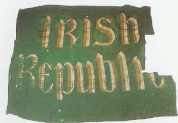By the time the American and French revolutions had taken place at the end of the eighteenth century, Ireland had been dominated by the English for half a millennium. Substantial parts of the island, especially the north-eastern area, had been planted with Protestant and Presbyterian settlers from Britain. The Treaty of Limerick had turned Protestants into first class citizens, Non-Conformists into second-class, and Catholics into non-citizens and the subject of Penal Laws.
Parliament was reserved for the Protestant landlord class, who controlled, according to Wolfe Tone ‘…five-sixths of the landed property of the nation…the quiet enjoyment of the church, the law, the revenue, the army, the navy, the magistracy, the corporations – in a word, of the whole patronage of Ireland.’
Although there were twice as many Dissenters (mainly Presbyterians) as Protestants, they did not enjoy the same privileges, and were engaged mainly in farming and manufacturing, centred principally in Antrim and Down. The Dissenters had supported the American Revolution and saw, both in it and in the French Revolution, the model which they could adopt and, by uniting with their Catholic fellow-countrymen, create an independent democratic secular republic.
A growing number of radical intellectuals in Dublin who were also informed by Enlightenment ideas and excited by developments in Europe and in America, including Thomas Russell, William Drennan, Napper Tandy and Wolfe Tone, began to formulate a political philosophy which was grounded on modern democratic principles.
Wolfe Tone’s pamphlet An Argument on behalf of the Catholics of Ireland helped convince the northern Dissenters of the possibility of common cause. In October 1991 Tone was in Belfast to assist in the formation of the first United Irishmen’s club, and a short while later formed a club in Dublin. The constitution of the Society of United Irishmen stated in its first article its intent as “forwarding a brotherhood of affection, a communion of rights, and an union of power among Irishmen of every religious persuasion”. By 1797 records show that the United Irishmen had 128,000 sworn members spread mainly across nine counties.
The society was legal until 1794 when it was finally suppressed by the government, but it continued to operate underground. By now, its well organised propaganda campaigns had succeeded in politicising the population at large, and the British were very well aware that the unity of purpose between Protestant, Catholic and Dissenter looked set to threaten its carefully worked out project of colonising, dominating, and eventually assimilating Ireland. A reaction to this was necessary.
In the north, in 1795, the Protestant Orange Order emerged. Members quickly took up positions in large numbers in the yeomanry, whose function was to supplement the military arm of government at local level. This could not have happened so quickly without the government’s consent, or more likely encouragement.
The second event of significance in 1795 was the founding of the Catholic seminary at Maynooth which cemented relations between the Roman Catholic church and Dublin Castle. The French Revolution and the closure of seminaries there had cut off the supply of priests, just as the Catholic population in Ireland was expanding. The fear was that if those seminaries were to reopen in the future, then young seminarians who were sent there for their education might pick up bad revolutionary habits.
That is the basis of the paradox that has beset Irish republicanism, the weaning away of the very people who might most consciously adhere to the ideals of republicanism – the Protestants and Dissenters, and the beginnings of a new brand of Catholicism known as Ultramontanism in Ireland.
Ultramontane Catholicism puts an emphasis on the supremacy of the Pope over local spiritual leaders such as Bishops, but also over rulers and governments. The British had never been able to subdue the rebellious Catholic Irish, the intention now was that the Pope and his bishops and priests in Ireland would take over that task, and that Maynooth College would turn out the new brand of priest with a new authoritarianism and a sectarian message which had not been explicit in the old semi-autonomous Irish Catholic Church.
So there is the double wedge that the British government used to destroy the unity of Protestant, Catholic and Dissenter under the banner of Irish republicanism. We live with the consequences of that to this day.
What was it that Wolfe Tone said? It was“England, the never-failing source of our political evils…”.
It is not that the English, or more properly the British, were done with that double act in Ireland. It became the standard British policy all around the world in every country that the emerging British Empire colonised – ‘Divide and Conquer’. The effects of setting tribe against tribe, religion against religion, do not disappear when the coloniser leaves, or in the case of Ireland, leaves partially. The negative, destructive, destabilising consequences live on and on with lethal outcomes.
Despite all that the British did to destroy Irish republicanism it survived and adopted to new ‘isms’ – nationalism, socialism, feminism – and absorbed them into the movement’s evolving ideals, the best expression of which is to be found in the Proclamation of the Irish Republic of 1916. There is a line in paragraph four of the Proclamation which refers back to the events of 1795 and the British manipulation of Irish society for its own ends – “…oblivious of the differences carefully fostered by an alien Government, which have divided a minority from the majority in the past“.
There is more, of course to this story. It will be continued.
